When Constantine briefly shone on NBC, one refrain was that no matter how bumpy the series’ run was, at least it wasn’t the Keanu Reeves version. But really, on re-watching 2005’s Constantine, I found it works—for all the reasons it shouldn’t. The fact that the actors were all given scripts that varied wildly in tone? Shouldn’t have worked. Casting Gavin Rossdale? Shouldn’t have worked. The costuming? OK, the costuming all works perfectly—Gabriel and Balthazar have both matched their socks to their ties! And the pocket squares… I can’t even think about the pocket squares.
But the biggest way Constantine works is by using Hellblazer as a jumping-off point, rather than a stone-carved outline to be slavishly followed. In doing so, it creates a moody piece of modern, metaphysical noir.
The film draws on Garth Ennis’ classic Dangerous Habits arc, which diagnoses Constantine with terminal lung cancer. In a theological update on the cop-goes-to-prison trope, the comic follows John’s byzantine attempts to cure himself… or at least fleece the Devil out of his soul. This plot ads an even more urgent level to the comics’ usual “Constantine as trickster character” element, gives John a ton of agency, and lets the reader sit back and cheer as John screws the most powerful entities in Hell, while also dragging Heaven into a standoff that they can’t resolve. It’s brilliant, and a perfect example of what makes Hellblazer fun to read.
The movie dispenses with this aspect entirely. John has no agency, and instead succumbs to hopelessness almost immediately after his single interview with Gabriel (an extraordinary Tilda Swinton) by accepting his inevitable damnation. This allows him to become the nihilistic anti-hero typical of noir. Since the film also changes John’s origin story, Constantine is now recast as a victim of fate, like the best noir heroes. Where in the comics and TV show, John overestimates his own power and accidentally kills a girl during an exorcism, here he is doomed from childhood. He was granted a “gift” of visions, which, without any sort of spiritual guidance, drove him crazy. His attempt to free himself through suicide sent him straight to Hell for self-murder, and his revival at the hospital only granted him a brief reprieve. The film stacks John’s odds in an elegant scene with Gabriel:
A.) The film’s theology states that suicide is an unforgivable sin.
B.) John, having absolute proof of the existence of God, is incapable of true faith anyway, so even if it was forgivable…
C.) John can’t repent.
Or, as Gabriel more concisely puts it:
Having set the stakes, the rest of the film unspools under a cloud of fatalism. This Constantine is not charming, or charismatic. He doesn’t use his wit or his wits to get himself out of trouble. He just bulls his way through exorcisms and demon encounters, waiting for death to come, until a detective named Angela presents him with a job and a chance at redemption. The plot is classic noir, expanded as far as you can take it: woman in trouble comes to gruff anti-hero for help, sings him a song of a woman in even more trouble (Angela’s sister, Isabel, who has been damned after a successful suicide of her own), together they head after a MacGuffin (The Spear of Destiny), discover Corruption that Goes all the Way to the Top (Lucifer’s son is in league with other demons to get the Spear and end the world), encounter an army of heavies who pummel the anti-hero (demons led by Gavin Rossdale), and cross paths with a mysterious turncoat (Spoiler alert: Gabriel isn’t 100% angel).
And Keanu Reeves (who can be a good actor) clearly understands Constantine as a noir anti-hero, delivering every line in a world-weary mutter, perfecting a Bogie-esque lip curl, and providing bitter, smart-ass commentary throughout. (Usually this is directed at Angela, but you get the sense that he’d bitch even if there was no one there to hear.)
The best scene in any noir is the one where the hero contemplates his cigarette or his bourbon—or both—wondering how the hell his life became such a shambles. What happened to the idealistic young man who fought in World War II? Was it the booze? The dames? The increasing awareness that life is a series of moral compromises that ends, inevitably, in death? Constantine plays with this sense of ennui and hopelessness by upping the stakes drastically—John Constantine knows that his suffering isn’t going to end with death, but only get worse.
The filmmakers also decided to change Constantine’s working-class London cabbie friend, Chas, into a newsboy-cap-wearing, wise-cracking assistant that would have been at home in a ‘30s film. Unfortunately, someone cast Shia LaBeouf (who as far as I’ve been able to figure out thought he was auditioning for a Robert Wuhl biopic that was wisely never filmed) so any fun screwball dialogue is shorted out. As an actor, Reeves tends to rise to the people around him, as he does handily with Rachel Weisz or even Tilda Swinton. Shia LeBouf is not talented enough to make anybody rise to the occasion, so their scenes together are the only part of the film that even I can’t defend.
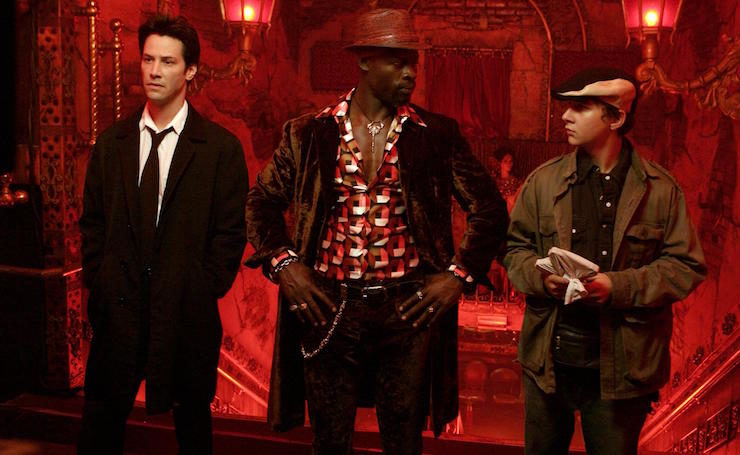
He’s also surrounded by other friends—Beeman, Hennessey, and Midnight, who refer to John’s former strength. Just like in a regular noir, our hero is a war veteran, but Constantine’s war was a demonic battle fought on a different plane of existence. His friends want to pull him out of the depressive spiral he’s in, but instead he coasts on his fame and asks too much of old brothers-in-arms. And, like a lot of noir characters, his cynicism masks an early dedication to morality. You get the sense that Constantine used to believe that his work would do good in the world, but now, as he’s lost hope that he can make up for his sins, he’s become more a mercenary than a champion of lost causes. He even tells Angela that he doesn’t need another ghost following him around, but where the comics made this literal—Constantine actually has ghosts of people he’s wronged following him like an entourage—here you just get the sense of a man haunted by guilt.
This sense of backstory comes together in a scene where Midnight prays over Constantine and Chas. (Each time I watch the film I hope that this will result in a miracle, and transform Chas into the older, bitter character from the comics—Doug Bradley, maybe? But alas, even Midnight’s powers have their limits.) Constantine grunts an incredulous, “Come on,” at his old friend and stomps away like a bitchy goth, while Midnight just keeps incanting.
Director Francis Lawrence plays up the film’s status as a neo-noir through settings, as well. He hangs a lampshade on the fact that we’re not in London, opening in the Mexican desert before moving to an apocalyptically orange-glowing LA. This ethereal light slowly shifts in tone from “tobacco” to “whiskey” to “cancer ward,” until the final confrontation with the devil seems to have been shot through a mint green hospital gown. In the opening scenes especially, if light can be filtered through a slatted window or the screen of a confessional booth, you can bet it will be. Rather than an ordinary apartment, they filmmakers give their hero a home/office that Philip Marlowe would love by moving Constantine into a long, incongruously deco space above a 1970’s-style bowling alley. There’s probably a bedroom? But we never see him sleep, just smoke at his table and spit blood into his bathroom sink. He eats at a streetcart downstairs. The one personalizing touch are the multiple 5-gallon jugs of water on the floor, all of which have crosses etched into them—presumably so John can tell the ordinary drinking water from the holy water. Rather than wearing Constantine’s original pinstripe suit/trenchcoat ensemble, he does a variant on the later, shabbier look—black slacks, white shirt, skinny tie, and trench coat—in this version it’s black rather than tan. The trench coat is a mainstay in classic noir, but as it’s far more suited to the weather in Philip Marlowe’s San Francisco or OG Constantine’s London, the fact that he always wears it in sunny, presumably modern Los Angeles marks him as an outsider in typical L.A. culture.
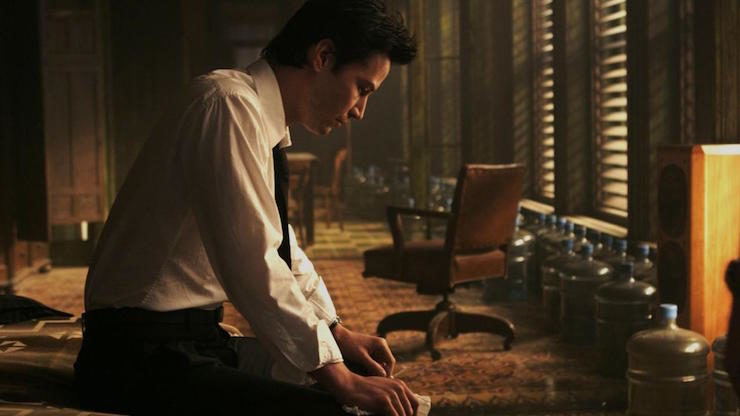
The noir hero is trapped in a world where the odds are stacked against him, rich men and dangerous women make rules he cannot follow, and his even his best actions are in vain. Here Constantine tries to make amends with God by “deporting” demons back to hell, yet rather than being forgiven for his suicide, he learns that he’s still going to Hell, mostly because he doesn’t have faith—but how can he have faith when his visions proved the supernatural world? How can he make up for a suicide, when no forgiveness is possible? There is no escape from Heaven’s rules, so “he’s going to a prison where half the inmates were put there by [him].” And so, he needs to use his wits to elude the devil.
However, after the crooked hand he’s been dealt, he also can’t be purely altruistic. He claims he pulls demons out of little girls to help them, but he’s always got one eye on his own ledger. He offers himself for Isabel at the end, but he does it knowing that the sacrifice he makes might be enough to create a loophole—and only after he specifically asks for a favor from the Kid with the Ant Farm.
In a few instances, Constantine improves on the typical noir tropes. All bitter shamuses (shamii?) smoke endless cigarettes, but here the lung cancer diagnosis ups the stakes, especially because Constantine actually looks sick the entire time. Not quite to the level of Sterling Archer in “Terms of Emrampagement,” but he starts out looking gaunt, and he just gets more and more haggard and hollow-eyed until he finally faces Lucifer.
And then there’s that scene with Lucifer. First of all, let’s just take a moment to acknowledge that Peter Stormare is one of the best devils to grace the screen. (It’s pretty much Viggo Mortenson and him.) Then, check out how they remake the classic Double Indemnity scene between Fred MacMurray and Edward G. Robinson.
But still, there’s something missing…a hole in the film. We have Lucifer as the big bad, the symbol of the terrible corruption/fallen human nature that is the true bad guy in every noir. We have Lucifer’s lackey. We have the hero’s friends, most of whom are nobler than him, and one of whom heroically takes a bullet meant for the hero. We have the cop who’s always a few steps behind. We have the innocent in need of rescuing. We even have a Maltese-Falcon-esque macguffin in the form of the Spear of Destiny. So…where’s our femme fatale?
Maybe you were thinking Rachel Weisz, since she’s the only femme around to be fatale? But it can’t be her, because she’s already the tough, playing-by-the-rules cop, who only teams up with the sketchy detective out of necessity, who’s also always two steps behind. All of her attempts at flirtation fall hilariously flat, and even after he’s rescued her, and her damned sister, the two don’t kiss.
What are the main qualities of the femme fatale? She is beautiful, alluring, she has a plan, she lures our hero into said plan, and even though he plays by her rules, he always gets fucked in the end. So, who’s the one asking Constantine to play by impossible rules, and laughing as his attempts fall apart, again and again?
Here, the crazy dame who walked into Constantine’s office is God.
Constantine was granted visions he can’t control. They drove him to suicide, which in turn damned him. God won’t forgive the suicide, even though (presumably) God was the one who gave Constantine the visions in the first place, without bothering to, say, drop some mental health literature onto his childhood nightstand. John spends his life exorcising demons, which is, yes, mercenary, but also a helpful use of his visionary abilities. It seems as though he was a valiant fighter for more-or-less good during the war that his friends allude to. He is very clearly chasing after acceptance or forgiveness, or at least some form of acknowledgment, which he never receives. In the end, the sacrifice for Isabel grants him a temporary reprieve, and Lucifer’s hate-healing of his cancer gives him a few more years of life. But now he just has to go back to playing by his Dame’s rules, and chasing validation that he won’t get. So, as Gabriel says, he’s fucked.
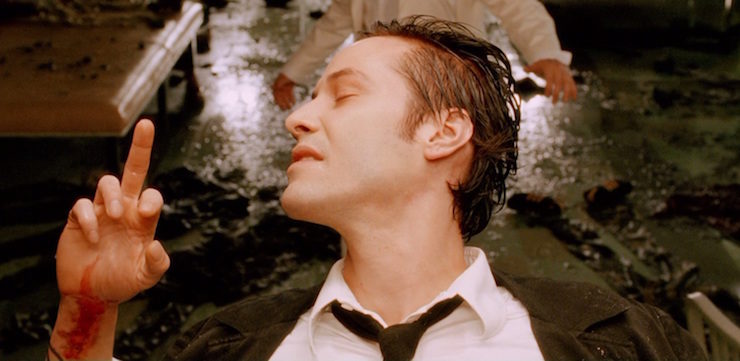
From its earliest days, noir was used to comment on the unseemly corners of the human heart. Constantine—while it didn’t bother to reflect its source material too closely, and while it’s not always a successful film—took a bold step in using the genre to explore the darkest corners of God’s heart.
Originally published in November 2015.
Leah Schnelbach loves Constantine, and if that’s wrong, she doesn’t want to be right. Come voice your opinions on Twitter!










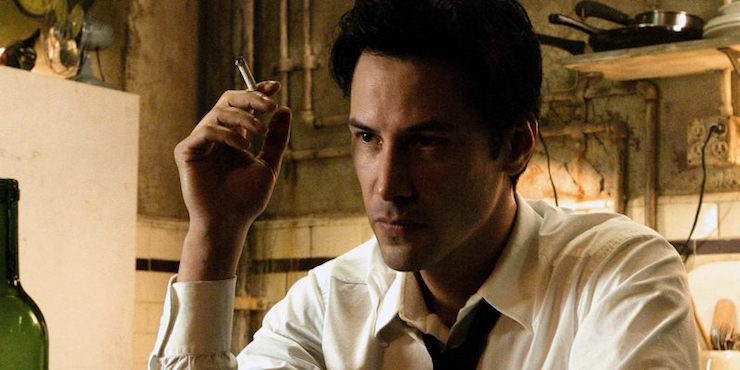
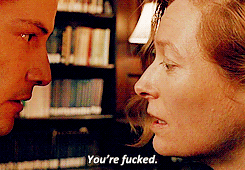
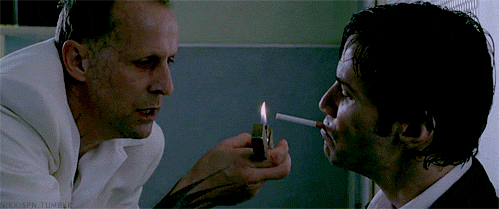
Peter Stormare is SUCH a good Lucifer, and the costuming was superb. No cliché “dapper demon” or horned monster, but a creepy, sort of diseased looking man with tar on his feet. Also, I happened to like that the whole plot to end the world by Lucifer’s son was decidedly NOT with Lucifer’s knowledge or permission and he didn’t try to further it just to be evil. Instead pulling a demon ex machine and sending his son into timeout without complaint. Plenty of movies will not let their bad guy do anything remotely good without at least an evil tantrum, so this adds dimension and it makes sense: Lucifer would have his own plans and he’s in no rush if he wants them to go perfectly.
This movie probably really worked for me because I wasn’t aware that it was an adaptation of a comic. So I really like this movie. There’s a part that always gives me goosebumps. When Constantine’s friend Beeman is about to get murdered, he tells Constantine “I know you’ve never had much faith; you’ve never had much reason to. But, that doesn’t mean that we don’t have faith… in you.”
This is the first time I’ve ever commented at Tor and I’m commenting just to say that I read this entire post, agreed with it in its entirety, and thoroughly enjoyed seeing Constantine in the light of having the tropes laid out so explicitly.
Thank you for the insight!
This movie stands alone and is unafraid to reinvent Constantine in such a way that it almost flat out replaces the original because it, literally, IS superior and creates a mood that has always stuck with me. All the cogs are mismatched and seemingly hand made by randomly chosen craftsmen and yet they, somehow, fit together nicely to create a beautifully dark machine powered by a bleeding heart that could otherwise not function in any other environment. In other words.. I loved this F-N movie. It is such a gorgeous, unapologetic and underappreciated mess.
I like to think that this movie and Prophecy are alternate universe / same multiverse (i.e. Earth 1 & 2). Therefore we just see 2 different, but similar versions of Gabriel’s fall; and 2 different, but similar versions of Satan’s ‘assistance’. (Bonus points because this means that Swinton and Walken are the same person.)
Give the guy a break. He’s made some good movies
It’s great to see a positive review of this movie, as I love it. Most of my friends immediately hated it because it wasn’t that Constantine, but I saw what the movie was trying to do and thoroughly enjoyed watching it. I bought the DVD to torment one of my friends that was particularly spiteful about it, and over successive viewings it cemented itself to be one of my favourite films of all time.
IMHO, Peter Stormare’s Lucifer and Tilda Swinton’s Gabriel are unparalleled and exceptional, truly showing the light in the bad and the dark in the good. They still unnerve me now, just thinking about their horrifically beautiful creepiness – something that is sorely lacking from modern “horror’s” gore-fest mentality. I may have been so effected them that I run a d20M game specifically inspired by these two; a game that may have prevented a housemate from turning the lights off, for a week.
This is something I’ve always said. Shitty adaptation, but a great movie regardless. Not many adaptations can be considered such, but Constantine is the one that immediately always comes to mind.
When I first saw the movie I was quite disappointed because I was hoping for it to stick closer to the source material. I hated this Chas, I wanted to have Ellie, and I wanted the Snob. As great as Swinton is here (and she is amazing) I think the story loses something by taking out the socioeconomic class themes of the original work. I also wanted Constantine to be the trickster confidence man that he often is in the comics. It only makes sense. How can human beings stand against the might of Heaven and Hell otherwise?
But with time, I’ve come to really enjoy this movie and what they’ve done with it (except for LeBeouf). I love the tone of it, and especially the catch-22.
I have loved this movie for YEARS and it was my feel-good movie all through undergrad, I would watch it whenever I was in a bad mood, and I am SO GLAD to see this review outline why I love it so much. Thank you! (And now I love it separate from how I love Matt Ryan’s Constantine, and how much I especially love him now on Legends of Tomorrow)